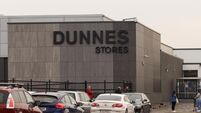Over 200 restaurants have closed this year costing the economy €288m

On average 22 direct employees lost their jobs as a result of each of restaurant closure along with approximately 13 indirect jobs.
Restaurant closures so far this year have cost the Irish economy €288m between lost wages and taxes with more expected as representative organisations once again call for a Vat cut for the sector.
According to a new report, authored by economist Jim Power on behalf of the Restaurants Association of Ireland (RAI), 212 restaurants, cafés, and other food-led businesses have shut their doors for good in 2024.














